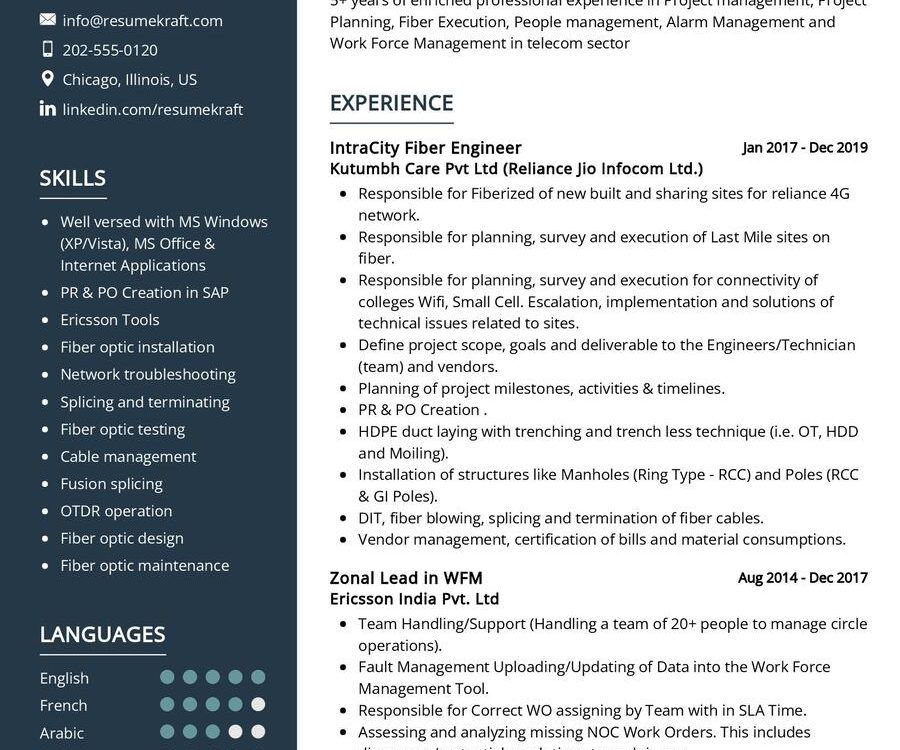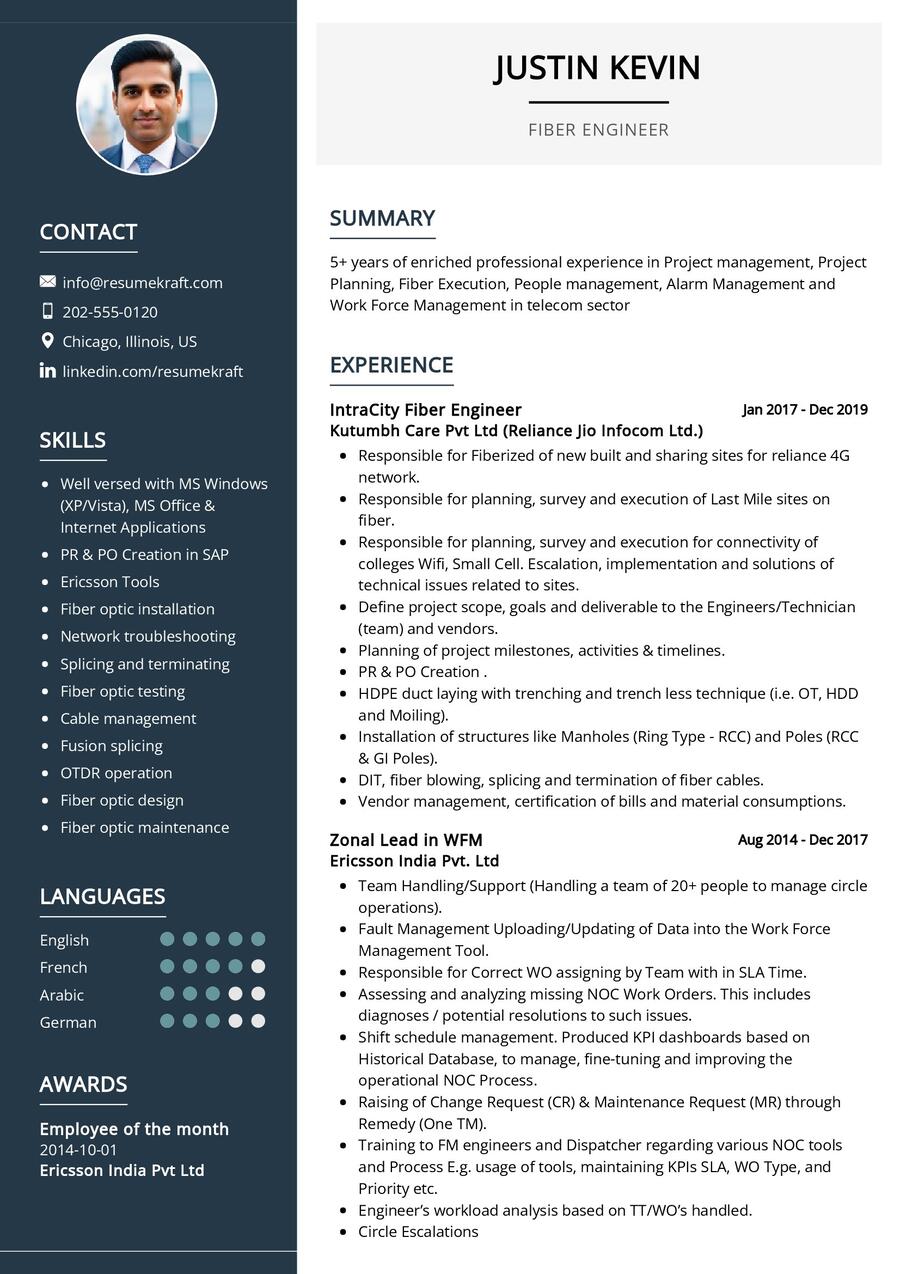Exploring the Role of a Fiber Engineer
The world of telecommunications is ever-evolving, and at the heart of this evolution is the crucial role of a Fiber Engineer. In this article, we’ll delve into the responsibilities, requirements, and key insights into what makes a stellar Fiber Engineer. This position combines technical prowess with strategic thinking, making it an integral part of the modern workforce.
Understanding the Fiber Engineer Job Requirements
Embarking on a career as a Fiber Engineer requires meeting a set of stringent requirements, a journey that demands both technical expertise and a commitment to continuous learning. Let’s delve deeper into the prerequisites that one needs to fulfill to embrace the role of a Fiber Engineer:
- A Bachelor’s or Master’s degree in Telecommunications, Electrical Engineering, or a related field, showcasing a strong foundation in the technical domain.
- Proficient knowledge of fiber optic technologies, including installation, maintenance, and troubleshooting.
- Hands-on experience in fiber optic network design and implementation, illustrating a trajectory of increasing responsibility.
- Leadership and project management skills, honed through experiences and possibly through courses and certifications.
- Proficiency in relevant software tools used in fiber optic engineering and design.
- Ability to work collaboratively in cross-functional teams and effectively communicate complex technical concepts to non-technical stakeholders.
Securing additional certifications in fiber optic technology can significantly enhance your profile and competitiveness in the job market.
Roles and Responsibilities of a Fiber Engineer
The position of a Fiber Engineer is multifaceted, requiring a blend of technical acumen and strategic thinking. Let’s unravel the core responsibilities that define this role, each contributing to the seamless functioning of modern telecommunication networks:
- Planning, designing, and implementing fiber optic networks, ensuring optimal performance and reliability.
- Conducting feasibility studies and site surveys to assess the viability of fiber optic installations.
- Collaborating with cross-functional teams, including network engineers and project managers, to ensure successful project delivery.
- Performing regular maintenance and troubleshooting activities to identify and resolve issues promptly.
- Staying abreast of industry trends and emerging technologies in fiber optic communications.
- Ensuring compliance with industry standards and regulations in all fiber optic installations and configurations.
Each responsibility comes with its own set of challenges and learning, shaping you into a sought-after Fiber Engineer.
Fiber Engineer CV Writing Tips
Crafting a CV for the role of a Fiber Engineer requires meticulous attention to detail and a focus on showcasing your technical and leadership capabilities. Here are some tips to help you create a compelling Fiber Engineer CV:
- Highlight specific projects where you led the design and implementation of fiber optic networks, detailing the impact on network performance.
- Quantify your achievements, using metrics to showcase improvements in network efficiency, reliability, or cost savings.
- List relevant certifications, emphasizing your commitment to staying updated with the latest developments in fiber optic technology.
- Personalize your CV for each application, aligning your skills and experiences with the specific requirements of the job.
Each tip is a brushstroke, helping you paint a portrait that is both compelling and authentic as a Fiber Engineer.
Fiber Engineer CV Summary Examples
Your CV summary is the opening statement of your career story, setting the stage for what follows. It should be a powerful snapshot of your journey, encapsulating your experiences, skills, and the value you bring to the table. Here are some examples to inspire you:
- “Experienced Fiber Engineer with a proven track record in designing and implementing high-performance fiber optic networks, adept at leading cross-functional teams to success.”
- “Dedicated Fiber Engineer with expertise in troubleshooting and maintenance, a strategic thinker who has significantly improved network reliability and performance.”
- “Innovative Fiber Engineer specializing in the latest fiber optic technologies, fostering a collaborative and efficient approach to network design and implementation.”
Each summary is a window to your career, offering a glimpse of your journey, your strengths, and your vision as a Fiber Engineer.
Building a Strong Experience Section for Your Fiber Engineer CV
Your experience section is the heart of your CV, pulsating with the rich experiences you have gathered over the years. It is a space where you narrate your career story, highlighting the milestones and the learning. Here are some examples to guide you:
- “Led the design and implementation of a fiber optic network for a large-scale telecommunications project, resulting in a 30% improvement in network efficiency.”
- “Spearheaded a team in troubleshooting and resolving complex fiber optic issues, reducing downtime by 25% and enhancing overall network reliability.”
- “Managed the successful completion of fiber optic installations in multiple locations, ensuring compliance with industry standards and project timelines.”
Each experience is a chapter in your career book, narrating tales of challenges met, solutions found, and successes achieved.
Sample Education Section for Your Fiber Engineer CV
Your educational journey is the foundation upon which your career stands. It is a testimony to your knowledge, your expertise, and your commitment to learning. Here’s how you can list your educational milestones:
- Master of Science in Telecommunications Engineering, XYZ University, a journey of deep learning and specialization, 2018.
- Bachelor of Science in Electrical Engineering, ABC University, the foundation stone of your career in telecommunications, 2012.
- Certified Fiber Optic Technician (CFOT), a recognition of your technical skills in fiber optic technology, 2019.
Each educational qualification is a stepping stone, leading you to the pinnacle of success in your career as a Fiber Engineer.
Fiber Engineer Skills for Your CV
Your skill set is your toolbox, equipped with a diverse range of tools that you have honed over the years. It is a showcase of your abilities, both innate and acquired. Let’s list down the essential skills that a Fiber Engineer should possess:
Soft Skills:
- Leadership and team management, the ability to steer your team towards successful project delivery.
- Communication and interpersonal skills, the art of conveying your technical thoughts effectively and building strong relationships with stakeholders.
- Problem-solving abilities, the knack of finding solutions to complex issues in fiber optic networks.
- Attention to detail, the meticulous approach to ensuring the reliability and performance of fiber optic installations.
- Adaptability and resilience, the strength to navigate through evolving technologies and industry standards.
Hard Skills:
- Fiber optic network design and implementation, a deep understanding of the intricacies of fiber optic technology.
- Proficiency in fiber optic testing and troubleshooting, skills vital in maintaining network reliability.
- Knowledge of relevant software tools for fiber optic engineering and design.
- Project management, the ability to see fiber optic projects through from inception to completion successfully.
Each skill is a tool, aiding you in providing exceptional service and leading your team effectively as a Fiber Engineer.
Common Mistakes to Avoid When Writing a Fiber Engineer CV
As you craft your CV, it is essential to steer clear of common pitfalls that can hinder your journey to landing your dream job. Here we list down the mistakes often seen in CVs and how to avoid them:
- Using a generic approach, a strategy that fails to highlight your unique fit for the role of a Fiber Engineer.
- Focusing solely on job duties without showcasing your achievements, resulting in a CV lacking depth and impact.
- Underestimating the importance of a well-crafted CV summary, a missed opportunity to grab the attention of potential employers.
- Overloading your CV with technical jargon, a strategy that can obscure your true value to non-technical readers.
- Neglecting proofreading, a mistake that can leave a negative impression on potential employers.
Each mistake is a pitfall; avoid them to craft a CV that is both authentic and compelling as a Fiber Engineer.
Key Takeaways for Your Fiber Engineer CV
As we reach the end of this comprehensive guide, let’s recap the key points to keep in mind while crafting your Fiber Engineer CV:
- Emphasize your leadership journey, showcasing the milestones achieved and the successful projects led as a Fiber Engineer.
- Highlight your technical proficiency, showcasing your expertise in fiber optic technologies and project management.
- Detail the strategic initiatives you have spearheaded, painting a picture of your visionary approach to fiber optic engineering.
- Include a section on continuous learning, showcasing the certifications and courses undertaken to stay updated with the latest developments in fiber optic technology.
Finally, feel free to utilize resources like AI CV Builder, CV Design, CV Samples, CV Examples, CV Skills, CV Help, CV Synonyms, and <a href="https://resumekraft.com/job-responsibilities


